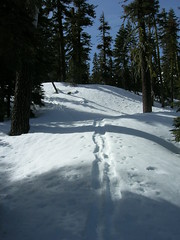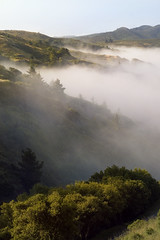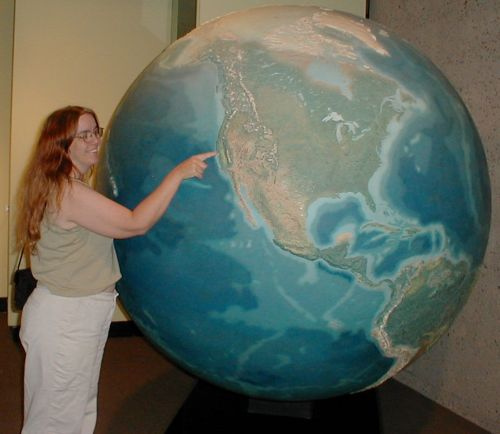In the early nineties, I took a geography lab from the best geography teacher I’ve ever had, at the best community college I’ve ever attended.
The class was sheer fun. For our first field trip, he asked us each to find cross country skis or snow shoes, then brought us up to Lassen Park in April, when the road was still closed by deep snow. We’d spent some time learning how to take field notes, find directions, and other elements of geography field work, and when we arrived at the park, someone asked, “Is there anything special we should be noting?” He replied, “No, really, I just wanted you to see what Lassen is like before the road opens.”
It was quiet, and everything was white. The fumaroles steamed from underneath the snow. He warned us about the hollows that melted out around the fumaroles, capped by snow, and told us about participating in the rescue (because he works in Lassen back country rescue, did then, still does) of a man who had fallen face down into a pit, and would suffocate down there if someone couldn’t get their face down there and provide him some rescue breathing until help could arrive to pull him out, which was considerably later.
He pointed out mountain chickadees by their calls, and explained the geology of the mountain. The joy he felt in this snowy park – his place, which he knew intimately, and wanted to share with us – was palpable to the point of magic.
Everything about that class, and its prerequisite basic physical geography classroom course, seemed to be because the teacher thought it was cool, that he wanted us to see these neat things he thought were cool. From him I learned how rare the Mediterranean climate type is, and he shared with us that he first settled in the Sacramento Valley, in the sixties, because he crossed the Sierra and saw a redwood tree and a palm tree growing side by side, and was charmed. When we learned about weather patterns over and currents within the ocean, he told us about his summer fishing in Ireland, when a hurricane in the Caribbean managed to send lobster pots up the Irish rivers. He spent a big part of one class playing us an NPR show about people who had been struck by lightning and survived.
That magic hooked me. That magic sucked me into geography as a field, something I could do, rather than a dry high school course where we figured out adiabatic cooling rates.
Geographiles would be a lot better off if more people who are captivated by the magic would actually teach it, write about it, and share what we love. Perhaps that’s a call to action.
Another everyday masterpiece: 'Small Prophets'
54 minutes ago


